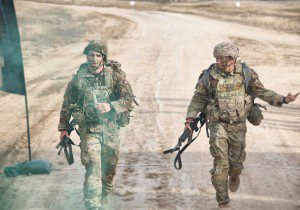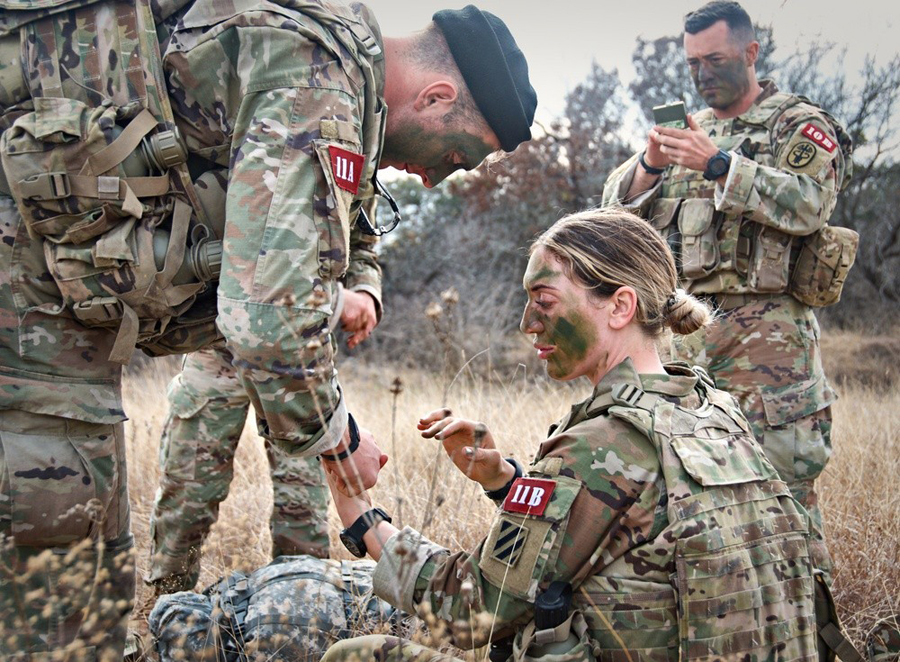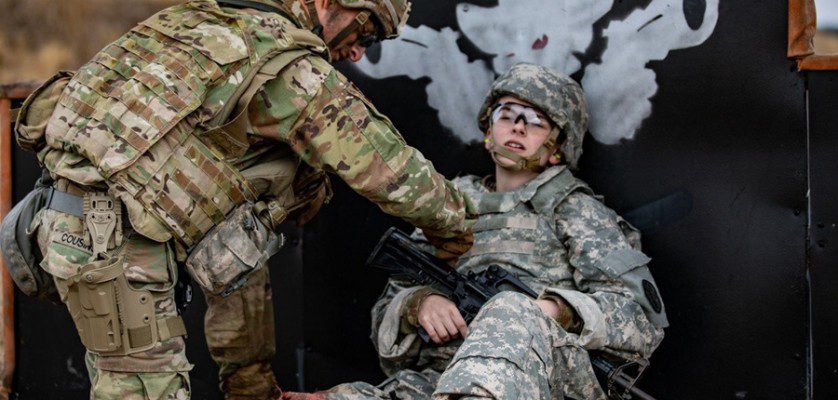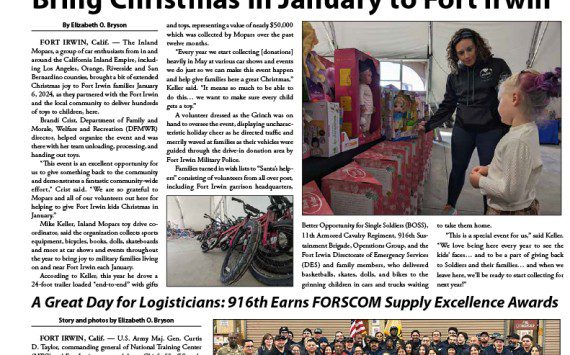The most challenging course during the 2022 Army Best Medic Competition became even more daunting after day-long rainfall over central Texas.
A downpour on the competition’s opening day at Fort Hood, Texas, made a 13-mile ruck march a muddy, heavy slog for 22 teams of contestants.
Yet Maj. Bryan Ahlborn and Sgt. 1st Class David McAfee didn’t let the hurdle stop them from blazing their way to an eventual first place finish during the contest, which took place Jan. 24-28.

The pair, representing Regional Health Command-Central, had already weathered through other physically demanding events of the annual contest before the afternoon ruck march.
“It was the thickest mud I think I’ve ever walked in,” said McAfee, a medic from Fort Irwin, Calif. “We were pretty tired. I got some pretty bad blisters from that ruck. And I think a number of the competitors didn’t finish there because it was pretty challenging.”
Many of the contestants carried packs that weighed about 50 pounds and had to march in the dark with only chemical lights to guide them.
Still, Ahlborn and McAfee managed to overcome the endurance test and several other physical challenges during contest. After placing third in last year’s Best Medic competition, Ahlborn and McAfee set their minds on winning the contest this season.
They placed a greater emphasis on physical fitness for 2022 and also attended additional trainings after placing as the top finishers in the RHC-C regional contest held at Fort Carson, Colo., in September.
That training included the medical master gunner course held at Fort Hood, Ahlborn’s duty station, and the Field Management of Chemical and Biological Casualties course at Aberdeen Proving Ground, Md.
“Last year there was no preparation beforehand or anything and we still did pretty well,” Ahlborn said. “So this year, with that extra training, it pushed us just above everybody else and helped us to win.”
McAfee, a Knoxville, Tenn., native, increased his workouts to twice daily and would run in the mornings and body build in the evenings. Ahlborn already had a robust fitness regimen but increased cardiovascular workouts leading up to the contest.
The pair said their skillsets perfectly complimented each other. McAfee, an experienced medic who has deployed to Afghanistan, used his expertise to solve obstacles that tested field medical procedures including the tactical combat casualty care lane. McAfee serves as the primary care noncommissioned officer at Weed Community Hospital.
During that test, contestants perform a dismounted patrol on a simulated improvised explosive device where they must pull casualties from the turret of a Bradley while reacting to simulated gunfire. And finally, contestants must bring the patient to a landing site to be airlifted by a medical evacuation helicopter.
Ahlborn, an Army optometrist from Owasso, Okla., had less medical training, but excelled at strength and endurance. Ahlborn earned his Expert Field Medical Badge or EFMB prior to entering last year’s contest. During one contest, the pair had to build a sandbag wall and Ahlborn carried four sandbags at a time.

“The [68W] medic skills are some of the main things that Sergeant McAfee excelled at. He’s an expert in those medical tasks,” Ahlborn. “And when it was a tough situation, usually, I would jump in physically and take over to give him a break so that he would be ready for whatever was next. But also on those medical tasks, I felt like we worked well together.”
Their combined efforts helped steer them ahead of the second-place finishers, Staff Sgt. Shaun Shea and Sgt. Matthew Farinella of the 75th Ranger Regiment at Fort Benning, Ga. Staff Sgt. Brian Leddie and Spec. William Duncan from the 82nd Airborne Division at Fort Bragg, N.C., finished third.
“We balanced each other out,” McAfee said. “We just ended up being a pretty well-rounded team.”
Other events included advanced land navigation training where contestants had three hours to find as many of 25 designated location points as they could. They also took part in a combat water survival test where contestants had to jump into water with combat gear and remove their equipment while submerged, then swim to and rescue a casualty. Contestants also were evaluated on how well they use radios to send medical evacuation requests and file reports.
On the contest’s final day on Jan. 27, Ahlborn and McAfee competed in a mystery event that turned out to be an obstacle course, where the pair had to complete the course while carrying a 200-pound dummy through low crawls, across fields, up hills, through mud and around barbed wire.
“You’re not just doing an obstacle course, you’re also hauling 200 pounds of a simulated patient with you through it,” Ahlborn said. “That was a pretty tough event.”
And finally, they finished the 72-hour event with a six-mile ruck march. Event organizers announced the winners during a ceremony Jan. 28.
“I think [the contest] is a good reflection of what our training should be oriented toward,” McAfee said. “It helps us being able to handle a broad spectrum of warrior tasks with an emphasis on pre-hospital medical care.”












